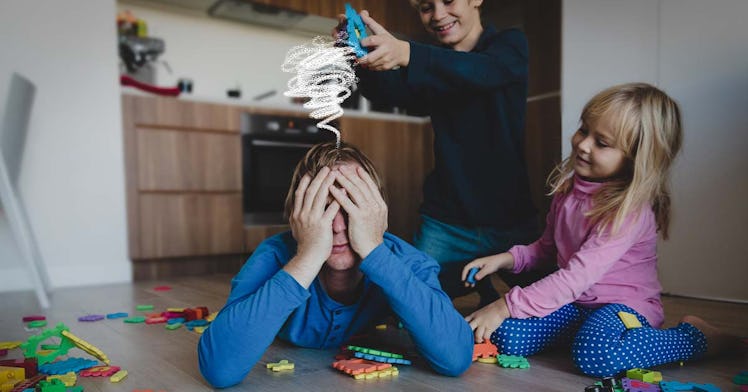‘Parental Burnout’ In The US Is Among Highest In The World
Americans are stressed and feeling burnout. But why?

Most of us don’t have the delusion that parenting is easy. We know that we will face some challenging times. We know all about functioning on little sleep. And have an understanding that we’ll have to make big decisions with little facts. We do all this while juggling raising our kids with the rest of life’s responsibilities. It’s a lot. That’s not new, but a new study says the level of parental burnout is bigger than ever — and that parents in the United States experience burnouts among the highest in the world. Here’s what you need to know.
Researchers from UCLouvain in Belgium surveyed 17,409 parents who have at least one child living at home in a new study. The researchers aimed to examine the state of parental satisfaction and exhaustion by surveying parents from 42 countries.
The data was collected between January 2018 and March 2020, before COVID-19 lockdowns and restrictions were in place. With the results based on pre-pandemic levels of burnout, burnout rates have likely increased significantly since.
As part of the study, researchers asked parents for basic information, including their age, sex, occupation, and how many kids they have. They were then asked to rank statements to assess how often they experience the symptoms of burnout. The range of scale went from “never” to “every day.” The statements measured emotional exhaustion, parental duties, emotional distance from their kids, the pleasure they have in being a parent ― all signs of burnout, and how they’ve changed since becoming parents.
The results showed that parental burnout varies greatly between countries. However, in looking deeper at the data, the researchers compared burnout rates to a set of measures including cultural values and traits. With this, they found an interesting link. Parents in Western or “Euro-American” countries tended to report higher levels of burnout.
Leading the burnout was Belgium, with 8.1 percent of parents experiencing burnout. Following right behind that was the US at 7.9 percent and Poland at 7.7 percent. This is in contrast with South American, Asian, and African parents who reported far less burnout.
So, why is this happening? Researchers believe the key reason why Euro-Americans, specifically highlighting Americans, experience more burnout is due to living in a culture that prioritizes self and personal achievements above looking out for people as a whole.
“Individualistic cultures, in particular, displayed a noticeably higher prevalence and mean level of parental burnout,” the researchers report in the study. “Indeed, individualism plays a larger role in parental burnout than either economic inequalities across countries, or any other individual and family characteristic examined so far, including the number and age of children and the number of hours spent with them.”
Adding fuel to this fire is the parental shaming that goes around in Western cultures, including the United State. “What parents feed their children, how they discipline them, where they put them to bed, how they play with them: all of these have become politically and morally charged questions,” the researchers write. “The distinction between what children need and what might enhance their development has disappeared, and anything less than optimal parenting is framed as perilous.”
So, how do we fix this? Is it something that can be fixed? The researchers say the first step to reel in parental burnout is to let go of the idea that we have to do all this by ourselves and shine a bigger light on the reality that no one is perfect.
‘The first would be to revive in our cultures the dimension of sharing and mutual aid among parents within a community,” the researchers suggest. “And abandon the cult of the perfect parent and gain some perspective on all the parenting advice out there in order to choose what works for you.”